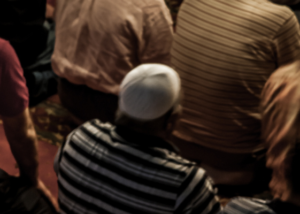Quran
Hadith
Islamic Text
Yes, some people will be called from all the gates of Heaven. It is hoped that (Sayidina) Abu Bakr (May Allah Most High be pleased with him) will be amongst them.
عَنْ أَبِي هُرَيْرَةَ رَضِيَ اللَّهُ عَنْهُ، أَنَّ رَسُولَ اللَّهِ صَلَّى اللهُ عَلَيْهِ وَسَلَّمَ، قَالَ: ” مَنْ أَنْفَقَ زَوْجَيْنِ فِي سَبِيلِ اللَّهِ، نُودِيَ مِنْ أَبْوَابِ الجَنَّةِ: يَا عَبْدَ اللَّهِ هَذَا خَيْرٌ، فَمَنْ كَانَ مِنْ أَهْلِ الصَّلاَةِ دُعِيَ مِنْ بَابِ الصَّلاَةِ، وَمَنْ كَانَ مِنْ أَهْلِ الجِهَادِ دُعِيَ مِنْ بَابِ الجِهَادِ، وَمَنْ كَانَ مِنْ أَهْلِ الصِّيَامِ دُعِيَ مِنْ بَابِ الرَّيَّانِ، وَمَنْ كَانَ مِنْ أَهْلِ الصَّدَقَةِ دُعِيَ مِنْ بَابِ الصَّدَقَةِ “، فَقَالَ أَبُو بَكْرٍ رَضِيَ اللَّهُ عَنْهُ: بِأَبِي أَنْتَ وَأُمِّي يَا رَسُولَ اللَّهِ مَا عَلَى مَنْ دُعِيَ مِنْ تِلْكَ الأَبْوَابِ مِنْ ضَرُورَةٍ، فَهَلْ يُدْعَى أَحَدٌ مِنْ تِلْكَ الأَبْوَابِ كُلِّهَا، قَالَ: نَعَمْ وَأَرْجُو أَنْ تَكُونَ مِنْهُمْ
Abu Hurairah (May Allah Most High be pleased with him) narrated that the Messenger of Allah ﷺ said, ‘Whoever spends a pair of things in the path of Allah (Most High) , will be addressed from the gates of Paradise: O slave of Allah, this is best. Whoever was amongst the people of Salah, will be called from the gate of Salah. Whoever was amongst the people of Jihad, will be called from the gate of Jihad. Whoever was amongst the people of fasting , will be called from the gate of al-Rayyan. Whoever was amongst the people of Sadaqah will be called from the gate of Sadaqah.’ Thereupon Abu Bakr (May Allah Most High be pleased with him) said, may my father and mother be ransomed for you, O Messenger of Allah ﷺ. There is no necessity upon the one who is called from those gates. However, will anyone be called from all of the gates? He ﷺ said, ‘Yes, and I hope you will be one of them.’ (Sahih al-Bukhari, 1897).
The Hadith above clarifies that people will be called to paradise based on deeds they were engaging in. However, there is some discussion amongst the scholars with regards to the meaning of ‘the people of salah, the people of Jihad, the people of fasting,’ and the like. Does it refer to simply engaging in these actions or does one have to be abundant in them. Both are possible and valid opinions.
وَفِيهِ دَلِيلٌ عَلَى أَنَّ أَعْمَالَ الْبِرِّ لَا تُفْتَحُ فِي جَمِيعَهَا لِكُلِّ إِنْسَانٍ فِي الْأَغْلَبِ وَأَنَّهُ إِنَّمَا فُتِحَ فِيهَا كُلِّهَا لِقَلِيلٍ مِنَ النَّاسِ وَأَبُو بَكْرٍ الصِّدِّيقُ مِنْ ذَلِكَ الْقَلِيلِ – إِنْ شَاءَ اللَّهُ. (الاستذكار)
In it (the Hadith) is proof that the norm is that all good deeds are not accomplished (in abundance) by every person. Rather very few people have that opened up to them. (Sayidina) Abu Bakr (May Allah Most High be pleased with him) is amongst those few, if Allah (Most High) wills. (Imam Ibn Abd al-Barr, al-Istidhkaar).
Imam Ibn Abd al-Barr seems to incline towards the opinion that one must be abundant in these deeds. Other scholars did seem to differ (see the link below for details). Ultimately, we should not focus too much on which opinion is sounder, both are credible. Rather we should focus on the immense mercy of Allah Most High and hope for the greatest possible rewards.
And Allah Most High Knows Best.
-Answered by Shaykh Noorud-deen Rashid (29.04.2022)
See also:
Is it true that people who fast have a special door to Paradise?
See also video:






